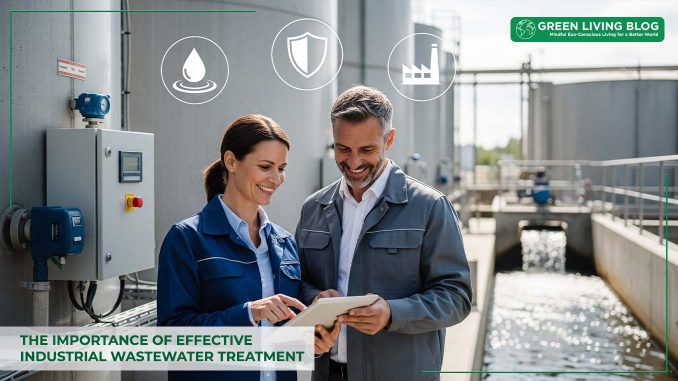
For businesses in the manufacturing sector, day-to-day operations often generate substantial amounts of industrial wastewater.
This water can contain a range of pollutants, from suspended solids to chemicals and oils, depending on the processes involved. Managing this wastewater correctly is a core part of environmental responsibility and operational compliance.
Regulations governing its treatment and disposal are in place to protect public health and prevent environmental damage, and failing to meet these standards can result in legal action, fines or reputational harm.
This guide provides an overview of industrial wastewater, explaining what it is, why it is necessary to dispose of it properly and the key practices businesses should adopt to handle it safely and lawfully.
Understanding Industrial Wastewater

Industrial wastewater refers to water that has been contaminated through manufacturing or industrial activities. It may contain a range of pollutants, including suspended solids, toxic chemicals, oils, organic matter, and heavy metals such as lead, mercury and cadmium. These contaminants can originate from processes such as metal finishing, chemical production, textile manufacturing, food processing and power generation.
Due to its composition, industrial wastewater is classified as hazardous and can pose serious threats to human health and ecosystems if released untreated. Exposure to certain pollutants may cause respiratory issues, skin irritation or long-term illnesses, while environmental impacts include water pollution, soil degradation, and harm to aquatic life.
How should Industrial Waste be managed?

Industrial waste must be managed by strict environmental legislation designed to protect human health and natural ecosystems. Under the Environmental Protection Act 1990, businesses have a legal duty to prevent contamination of the surrounding environment. This includes the proper handling, storage, and treatment of wastewater to meet specific standards. If wastewater is to be discharged, it must be treated to reduce harmful substances to within authorised thresholds.
In addition, the Water Resources Act 1991 requires businesses to take steps to avoid polluting public watercourses. This includes preventing both direct discharges of untreated or inadequately treated waste and indirect contamination caused by poor waste management practices or infrastructure failures.
Regulatory compliance involves monitoring wastewater output, using licensed waste carriers where applicable, and obtaining the necessary environmental permits. Breaches of these obligations can lead to enforcement action by environmental agencies. Sanctions may include formal cautions, unlimited fines, or imprisonment, particularly where pollution causes lasting harm or poses a serious threat to public health.
What are the best Practices for handling Wastewater?

Create a wastewater management plan
A wastewater management plan is a structured document that details the types of waste your business generates, how each waste stream is handled, who within the organisation is responsible, and the procedures in place for water treatment, reuse, or disposal. It should include site-specific practices, potential risks, and contingency measures in case of spills or system failures.
While there is no legal obligation to produce a plan, doing so is widely encouraged. It can support regulatory compliance by helping your business meet environmental permit conditions and demonstrate due diligence during inspections. A well-maintained plan may also reduce operational costs by improving process efficiency, identifying opportunities for recycling or reuse, and avoiding the penalties for improper disposal.
Maintain detailed records
Businesses should maintain a comprehensive log that includes the types and volumes of wastewater produced, the dates it was collected or disposed of, the method of disposal, and the name and licence number of the waste carrier or treatment facility used. These records provide traceability and can serve as evidence of compliance with environmental regulations.
In the UK, proper documentation also means using Waste Transfer Notes (WTNs) for non-hazardous waste and Consignment Notes for hazardous waste. Each note must include the correct European Waste Catalogue (EWC) code, which classifies the waste type. For example, wastewater sludge containing hazardous substances may be classified under EWC code 19 08 13*.
To determine whether your wastewater is hazardous and assign the correct code, businesses should refer to the WM3 Technical Guidance. This document outlines the classification process and helps ensure compliance with the Duty of Care under the Environmental Protection Act.
Maintaining these records over time allows your business to:
- Demonstrate legal compliance during inspections or audits
- Protect against liability if a third party mishandles the waste
- Monitor waste trends and identify opportunities for process improvement
- Records must be retained for at least two years for non-hazardous waste and three years for hazardous waste.
Use a licensed carrier
If your business does not treat wastewater on-site, it must arrange for collection and transport by a licensed waste carrier. While these carriers are authorised to handle and dispose of waste in line with environmental regulations, responsibility for the waste remains with your business even after it has left your premises. Choosing a carrier with the appropriate licence and a strong track record in managing industrial wastewater is essential, as their experience can help reduce the risk of errors during transport or disposal.
By following these best practices, your business can remain compliant when handling wastewater, reducing the risk of regulatory breaches and minimising disruption to operations.
![]()
Author Profile
- Online Media & PR Strategist
- Blogger and Educator by Passion | Senior Online Media & PR Strategist at ClickDo Ltd. | Fascinated to Write Lifestyle Blogs in News & Education I have completed a journalism summer course at the London School of Journalism and manage various blogs.
Latest entries
 List postFebruary 3, 2026Top 20 Green Sustainability Events to Attend in 2026
List postFebruary 3, 2026Top 20 Green Sustainability Events to Attend in 2026 Green ShoppingJanuary 20, 20266 UK Brands Offering Sustainable Gifts All Year Round
Green ShoppingJanuary 20, 20266 UK Brands Offering Sustainable Gifts All Year Round BusinessOctober 29, 2025Top 6 UK Government Green Funds & Grants for SMEs
BusinessOctober 29, 2025Top 6 UK Government Green Funds & Grants for SMEs List postOctober 16, 202510 Best Green Hosting Services in the UK
List postOctober 16, 202510 Best Green Hosting Services in the UK






Leave a Reply
You must be logged in to post a comment.